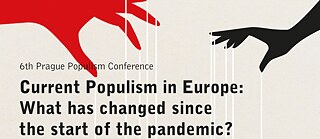6th Prague Populism Conference
Pandemic and Populism

How has the coronavirus pandemic changed the political landscape and public discourse in Europe? This was the issue explored in a discussion to mark the opening of the 6th Prague Populism Conference held by the Goethe-Institut.
By Annette Walter
What are the effects of the coronavirus pandemic on political developments in Slovakia and the Czech Republic, as well as in Germany, and how is this linked to populist parties in these three countries? This was the topic discussed by political scientists Viera Žúborová, Paula Diehl and Ondřej Císař, together with Katarzyna Wielga-Skolimowska of the Goethe-Institut Saudi Arabia, at an event to mark the opening of the Prague Populism Conference. At the heart of the discussion was the issue of how the populists are currently positioned in comparison to the established parties and the media, and how the pandemic has intensified this development.
Crisis of liberal democracy
Viera Žúborová, political scientist and director of the Bratislava Policy Institute, observes an increased level of mistrust in state organisations among the population in Slovakia, owing to the pandemic. But people’s mistrust of one another has also increased, deplores Žúborová, whose research focuses on the topics of populism, extremism, civil society, intolerance and hate speech. She believes that liberal democracy is in crisis and the success of populist parties in Europe is a symptom of this development because all countries are undergoing considerable change. “Populism is the result of the global change of political structures.” But she is also confident, because during the pandemic, local politicians in her country proved that they were able to put things right in a better way than politicians operating at national level; she regards this as a positive sign for democracy. Her conclusion: “The Czech Republic and Slovakia have a strong civil society, which means they won’t be following the path of Poland or Hungary.”Civil society must spring into action
Paula Diehl, professor of political theory and the history of ideas at Kiel University (CAU), believes that the intervention of civil society is immensely important to minimise the influence of populist movements. The major parties in Germany are also in crisis. The AfD is currently trying to exploit capital from the “Querdenker” (literally “lateral thinkers”) protests. A similar development occurred in the USA where former US President Donald Trump, who was recently voted out of office, had denied the existence of the coronavirus for some time. “Populist movements want to return to the homogenous society of the 19th century,” explains Diehl. The majority of Germans continue to support the policies of the federal government, however.Ondřej Císař, political scientist and professor of sociology at Charles University in Prague, has also observed populist movements in his home country, the Czech Republic. ANO 2011 (abbreviation of “akce nespokojených občanů”, “campaign of dissatisfied citizens”), the party of prime minister Andrej Babiš who has been in power since 2017, is regarded as leaning towards populism, even though Císař sees that Babiš, who used to be a businessman, has a tendency to run the country like a company.